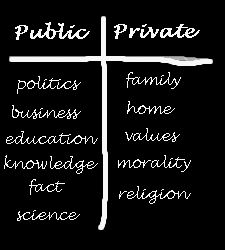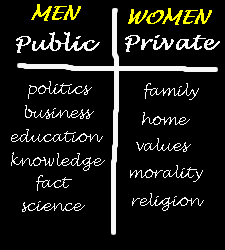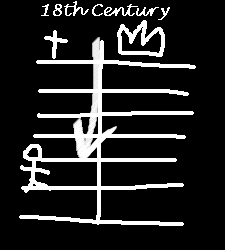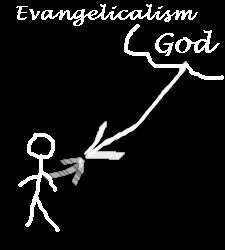

The spatial separation between life and work and between family life and work life was paralleled by a different way of understanding the world. We don't have the time to fully explore this transition but it tended to breakdown community commitments in favour of private, individual ones and this eventually had a corrosive affect on family life itself. The elements which had the most obvious effect on religion in general and the Alliance in particular were the distinctions between facts and knowledge on the one hand and values, morality and religion on the other and the redefinition of gender roles.
above: Public / Private split which characterized the late19th Century |
The Public / Private split had below: |

In the pre-industrial household all members of the family were required to be productive to ensure the well being of the family. Although there were specific roles played by men, women and children, all played some role and all needed the others. With industrial, factory production it was increasingly common for one or two members of the family to be the ones to go out to work and bring home the money required to support the others. In the early years of factory production it was not at all clear that it was the men that should be the wage earners. In fact the industrialists were happy to fill their factories with children and particularly women. Many industrialists argued women were better workers than men. A social and economic battle was fought in the early 19th century the outcome of which was the definition of men as the primary wage earners. This battle was accompanied by a redefinition of gender roles to comply with the above public/private separation of life. Men came to be associated with the public sphere and women with the private or domestic. Interestingly as this happened, the definition of what it meant to be a man and what it meant to be a woman began to change. Men needed to function in the public sphere which was seen as cold and uncaring and harsh. Men came to be defined according to this environment and needed to be tempered and softened by the domestic sphere which was warm, accepting and nurturing. Women were viewed as being especially outfitted to provide this kind of environment for their children and men. Thus women were redefined as essentially moral and religious but also soft and vulnerable and needing the protection of their publicly oriented men. This view of men and women was invented by the 19th century middle class and became so influential by the 1950s and 1960s it seemed like this is the way it had always been.2
The division of men and women into public and private spheres was further supported by a division of knowledge, facts and science from values, morals and religion. In private, one was welcome to hold to any religion and follow any morality but in the public sphere these had to be put aside. The smooth functioning of economic and political structures required just the facts, which it was believed every reasonable person (well at least reasonable men) could readily agree on. This would avoid the misunderstandings and emotionally charged disputes that so often arose over religious and moral issues. Men in public were rational, women in private were emotional. Religion had nothing to offer to political and economic life beyond shaping the character of the men who would move into public roles. Morality was privatized and marginalized and, for reasons we will explore presently, the religious community consented and even encouraged this new arrangement.
Simpson was living and working in a period of time that has been referred to as the "Gilded Age." It was a time of rapid change and to many it brought wealth and prosperity. But the image of the Gilded Age was to capture the reality that, although things looked bright and shiny, a very thin layer of gold covered some ugly stuff underneath. Alongside the great fortunes amassed by the great American families like the Carnegies and Rockefellers, life for many in industrializing North America was worse than it was before. The independent small producers were being pushed out of business and a lot of people saw their lifestyle and social prospects diminish. This was an age of much contrast and change and an age when the accepted, comfortable understandings of the world were eroding. It felt to many like the world they had known was disappearing. It was now lost. As a result there was a search for something to give meaning and purpose to life, something which would provide hope and direction. In this way too, Simpson’s historical context is remarkably similar to our own.
 Now,
to look more carefully at the religious context and particularly the role
of evangelicalism in the 19th century. I mentioned earlier that the
public/private split was not resisted and that evangelicals embraced it with
great enthusiasm. To understand this we need to take a bit of a tour back
into the 18th century. Society was viewed as a hierarchy as I've tried
to illustrate in the virtual chalkboard on the left. The world was divided
vertically between the Church (represented by the cross) and the Crown or
the political structure (that squiggly thing is supposed to be a crown) and
horizontally into social levels. In a Christian nation, it was assumed
that politics and religion should support one another. The Crown was to ensure
an environment in which the Church could make Christians who would also be
good citizens and the Church was interested in the Crown making happy prosperous
citizens who would also be good Christians. Authority (the arrow thing),
both political and religious, flowed from the top down, from God to the Monarch
to aristocrats and so on all the way down to average people (that little
stick figure is you and me, rather average looking we are). The way to be
a good citizen and live a socially productive life was to fulfill the
responsibilities of your position in the hierarchy and to do what you were
told. On the religious side the grace of God, just like the political authority,
flowed from the top down. At the top was a Pope or an Archbishop and the
grace of God flowed down through the religious hierarchy, through priests
and the sacramental life of the church to the parishioner. This was a fully
integrated society and worked quite well for a while. However in the 18th
century this was breaking down. The reasons are complex and we will concentrate
our attention on the role of evangelical religion in the story.
Now,
to look more carefully at the religious context and particularly the role
of evangelicalism in the 19th century. I mentioned earlier that the
public/private split was not resisted and that evangelicals embraced it with
great enthusiasm. To understand this we need to take a bit of a tour back
into the 18th century. Society was viewed as a hierarchy as I've tried
to illustrate in the virtual chalkboard on the left. The world was divided
vertically between the Church (represented by the cross) and the Crown or
the political structure (that squiggly thing is supposed to be a crown) and
horizontally into social levels. In a Christian nation, it was assumed
that politics and religion should support one another. The Crown was to ensure
an environment in which the Church could make Christians who would also be
good citizens and the Church was interested in the Crown making happy prosperous
citizens who would also be good Christians. Authority (the arrow thing),
both political and religious, flowed from the top down, from God to the Monarch
to aristocrats and so on all the way down to average people (that little
stick figure is you and me, rather average looking we are). The way to be
a good citizen and live a socially productive life was to fulfill the
responsibilities of your position in the hierarchy and to do what you were
told. On the religious side the grace of God, just like the political authority,
flowed from the top down. At the top was a Pope or an Archbishop and the
grace of God flowed down through the religious hierarchy, through priests
and the sacramental life of the church to the parishioner. This was a fully
integrated society and worked quite well for a while. However in the 18th
century this was breaking down. The reasons are complex and we will concentrate
our attention on the role of evangelical religion in the story.
The advantage of the union of the church and the state was that religion was taken seriously in public life and could speak to politics, economics, science, philosophy, any arena in which it felt it had something to contribute. The disadvantage was that religion was implicated in all of the actions of the state and was used by the state to political, diplomatic, economic purposes which had little to do with the Gospel. When Christianity was the state religion it was essential to be seen as a good Christian if you wanted social or political advancement. In many ways religion became a matter of civic duty rather than personal commitment. Many evangelicals were critical of this arrangement because they believed it to be detrimental to true religion. If Christianity were to be a living reality in the lives of the people, and this was the emphasis of 18th century evangelicals, it needed to be a personal commitment rather than a duty.
 Evangelical
religion and the revival which arose in England and North America in the
mid-18th century understood the grace of God in a radically new way. The
virtual chalkboard on the right attempts to illustrate the difference between
the evangelical view of God's grace and the 18th century view we considered
earlier. Here God's grace is completely unmediated. Grace encounters the
individual directly and the individual's responsibility is to receive the
grace freely offered (this is represented by the little arrow moving up to
meet the big one representing God's offer of grace). This was a radical
restructuring of the role of the individual. Now one was viewed as being
responsible directly to God as opposed to fulfilling one's duty within a
great religious, social, political hierarchy.
Evangelical
religion and the revival which arose in England and North America in the
mid-18th century understood the grace of God in a radically new way. The
virtual chalkboard on the right attempts to illustrate the difference between
the evangelical view of God's grace and the 18th century view we considered
earlier. Here God's grace is completely unmediated. Grace encounters the
individual directly and the individual's responsibility is to receive the
grace freely offered (this is represented by the little arrow moving up to
meet the big one representing God's offer of grace). This was a radical
restructuring of the role of the individual. Now one was viewed as being
responsible directly to God as opposed to fulfilling one's duty within a
great religious, social, political hierarchy.
Evangelical religion's dismantling of the hierarchy on the religious side, not surprisingly, had implications for the political. Evangelicals no longer viewed the close connection between the church and the crown as a source of strength. The structures of the church were not viewed as the essential means of grace and the connections with the state ensured that the older nonevangelical religious establishment had social, political and economic advantages the evangelicals could not match. In this context, evangelicals became vigorous opponents of a public role for religion. The private, personal encounter with God was the focus of their attention. God's grace was offered and the individual was free to, indeed had a responsibility to, accept the gift and enter into the state of grace. Evangelical religion had a close parallel in the political arena. A powerful political theory was on the rise which also opposed hierarchy and focused on the individual. Democracy was claiming that society was made of individuals freely choosing to associate with one another. The citizen had a responsibility to the state and fellow citizens after freely entering into the political state. This freedom of choice continued in areas of private life where religious and moral choices would be up to the individual but in matter of government and public life, it was necessary that choice be curtailed to ensure cooperation.
Democratic government and evangelicalism both required that religion be moved into the private sphere. For governments this was to preserve essential freedoms and social harmony and for evangelicals to preserve the vital ingredient of personal commitment. Evangelicalism was thus an important ally in the democratization of governments which took place in Britain, the United States and Canada in the 19th century.3 In the process Evangelicalism became a major organizing idea as the average person sought to understand and place themselves within the social change outlined above. This resulted in the evangelical churches being immensely influential.
As religion moved out of public life and into private, it paradoxically had more influence in society. It is for this reason that Hugh McLeod, a historian of religion in Europe, regards the 19th century as the paradigmatic century of secularization and of religious revival.
…The nineteenth century was both the archetypal period of secularization, and a great age of religious revival: as large numbers were alienated from the official church, religion ceased to provide a focus of social unity; but it became instead a major basis for the distinctive identity of specific communities, classes, factions in a divided society. Many people found their loyalty to their churches intensified in the process.4
Here is a Canadian illustration of McLeod's point. In what is now Ontario, the first religious census was taken in 1846, three years after Simpson was born. At this time there was still an official link between the colonial government and the Church of England. The argument was that the only way to ensure Canada West would develop as a Christian colony was to give the Anglican Church government resources and privileges allowing them to serve the spiritual needs of the people. At this time about 16% of the population of Canada West said they had no religion. Shortly after this, in 1854, the last of the privileges of the Church of England were formally dismantled to create what we might now call a level playing field for religious competition. The outcome of this was rather remarkable. By 1901, 0.5% of people in Ontario claimed no religion. Through the later half of the 19th century people were increasingly identifying themselves with Christian churches. The majority of growth involved evangelical churches, although Catholics also made considerable gains during this time.
By the 1880s, when Simpson was beginning his independent ministry, there was some evidence that evangelicalism was falling victim to its own success. The major divisions which would become so obvious in the fundamentalist/modernist battles of the early 20th century were beginning to appear as little cracks. Simpson was born into the mainstream of 19th century evangelicalism but as he looked around him, he had a sense that something was missing, that although evangelicalism was at the peak of its influence, it had lost something of the life and vitality which had once been its essential characteristic. More and more evangelicalism was the respectable religion of the middle class, the religion of the prosperous. Something of this is reflected in Simpson's experience at 13th Avenue Presbyterian Church. This was a good evangelical church by 19th century standards, but Simpson was disappointed that the church was not willing to enter into his enthusiasm to bring Italian immigrants to Christ and into fellowship.
We might be able to characterize Simpson's motivation, particularly after 1881, as a quest to recapture that inner power and return to the sources of holy living and Christian service which had been characteristic of evangelicalism at an earlier stage. Simpson's distinctive teaching attempted a recovery of an encounter with the full blessings of Christ's atonement as the source of spiritual life, of moral character and spiritual vitality. Simpson spoke to the powerful and prosperous evangelical world of the late 19th century with a message of submission to the all-sufficient Christ for all of our spiritual and physical needs. Simpson was able to actually live out this message, first with the ministry of the Gospel Tabernacle and then the ministry of the Christian and Missionary Alliance. It is to this story we now turn.
Now move to an explanation of the founding documents and pose some questions for evaluating the founding and the early work.
Simpson's independent ministry at the Gospel Tabernacle predates the Alliance and there are important continuities between the two. Begin reading with the "The Story of Providence" (Reading 4.1). Although this story overlaps the beginning of the wider Alliance movement, this gives us a good indication of how Simpson lived out his convictions in a local church context.
We then move to the story of the founding of two Alliances in 1887. This is told in Chapter 4 of All for Jesus. After having read that return to "Readings" and consider the following questions as you read.
Reading 4.2
Reading 4.3
After the founding of the Alliance we consider the incredible range of activity that the early Alliance sustained. The story is told in chapters 5-6 of All for Jesus and in Reading 5.1.
Other readings focus on particular aspects of the ministry of the Alliance. As you read through this material, look for what brings a unity of vision and purpose to the great variety of activity.
Reading 3.1 investigates the influence of Simpson's hymns.
Reading 5.2 looks at the range of social issues Simpson wrote about or addressed more tangibly through direct action.
Reading 5.3 explores Simpson's defense of a role for women in ministry.
Reading 7.1 is Simpson's own explanation of his motivation for missions.
Reading 7.2 analyses the theology and methodology that Simpson developed in the area of world evangelization.
Have fun with this and be in touch if you would like further explanation of this material.
1 Peter Laslet, The World we have lost, 2nd. ed., (London: Methuen, 1971).
2 Some of the current gender issues we are dealing with in our churches and our society go back to this arrangement. Men often feel alienated in their homes believing nurture and caring are not their responsibility and that they couldn't do it even if they wanted. Likewise many men consider religion something appropriate to women and children but not to them. On the other side, women have been shut out of business and political activity. Interestingly women have been active in attempting to revise these gender definitions to open public life to them because they correctly recognized that social and economic power were located in the public sphere. Men on the other hand seem not to be clamouring for more legitimacy in the private or domestic sphere because there seem to be no benefits in doing so. I would hope that this division of life could be revised so as to do away with the public/private duality.
3 Nathan O. Hatch, The Democratization of American Christianity, (New Haven: Yale University Press, 1989).
4 Hugh McLeod, Religion and the People of Western Europe, 1789-1970, (Oxford: Oxford University Press, 1981).
© Kenneth L. Draper, 1997.